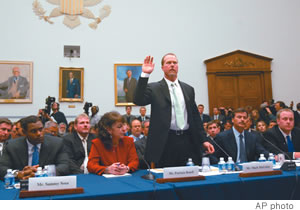An Open Letter To Mark McGwire

Wednesday - January 20, 2010
| Share
 Del.icio.us
Del.icio.us
|
Congratulations on your new job. I don’t doubt your knowledge about hitting or your ability to pass along such information. Also, I begrudge you no ill will in your return to the game.
While the wonderful summer of ‘98 has gone from one of excitement and historic awe to just another sad chapter in a decade poisoned by the use of illegal drugs, it is unfair to persecute you when your employers and union were, at the very least, silent enablers. To do so would be to pick one target for rage while ignoring other guilty parties. Or to paraphrase Dix from the 1988 film Off Limits, “You’re floating in a big sea of crap and instead of just staying in the boat, you reach out and you pick up this one little turd, and you say, ‘This turd pisses me off. I’m gonna do something about this turd!’”
With that said, I have a request. Quit dancing around the facts. It insults our intelligence.
In your conversation with Bob Costas on the MLB network, you said that steroids provided no boost in performance during your career. It’s admission without responsibility.
Like nearly everyone else frighteningly close to the steroid issue, you stuck to the tired story that steroids don’t help hand-eye coordination or replace sound technique. This, of course, flies in the face of scientific opinion that added muscle mass can lead to increased bat speed and therefore, greater velocity transferred to the ball. But even if you truly believe that performance-enhancing drugs didn’t give you an advantage - denial is a tremendously potent stimulous - why would you feel it necessary to apologize to the Roger Maris family? Innocence requires no explanation. Telling Bob Ley at ESPN you called Maris’ widow, Pat, just because that’s the kind of guy you are, explains nothing and sounds like a publicity ploy to show yourself in a more positive light.
You told everyone who would listen that you used the drugs for the sole purpose of getting healthy and, again, that the drugs offered no benefit. Now follow me for a minute, Mark. If steroids allowed you to take the field, then they did in fact help you hit home runs. You can’t launch gopher balls from the bench.
R. G. Tobin, a professor of physics and astronomy at Tufts University, in his 2007 paper “On the potential of a chemical Bonds: Possible effects of steroids on home run production in baseball,” reported that “It is well-established that the maximum force a muscle can exert is proportional to its cross-sectional area ...” and that “... a 5 percent increase in bat speed leads to an increase of 4 percent in the speed of the ball as it leaves the bat.”
Though the Mitchell Report said that steroid use was so rampant that shipments of the drugs were being sent to MLB locker rooms, you maintain that you had never heard anyone speaking about the drug use in any locker room you were in. But you tell Costas that you got introduced to steroids during the winter of 1989-90, that they were readily available at any gym you walked into, and that the drugs were openly discussed in such places. Yet we are supposed to believe that with such open use of steroids during that time, your locker rooms were the rare safe havens where the topic was never brought up, even though the sport’s biggest admitted user dressed in the same room.
You say you only used low-dose steroids and only for short periods of time, though countless reports quote FBI sources who say you were using highly advanced drugs. Greg Stejskal, a retired FBI agent, told ESPN that they had two witnesses other than Jose Canseco who had seen you use the drugs. He also said, “We knew this wasn’t a onetime shot or an experimental thing. This guy had a regimen and stuff.”
Mark, I do believe your tears were real. It is easy to understand the emotions coming out when you spoke with your father in 1996 about possibly retiring after four straight years of health problems. One can also understand the difficulty in telling your children that their father had, for years, used illegal drugs, and prepare them for the onslaught of critical comments.
Mark, forgiveness is available. But actual contrition is required. In your testimony before Congress in 2005, you vowed to spread the word about the dangers of steroid use, and outside of a few checks written to a couple of charities, you’ve done nothing. Take this opportunity to make good on your promise. Use your status, your wealth and your position to make sure that no one follows your example. You said you “acted stupid” and that you wish you had never taken the drugs or had played in the era.
Good for you. Now do something about it. Make amends. Forgiveness cannot come without penance. Do that, and no one can deny you your right to once again be a big part of the game. Until then, there will always be questions.
E-mail this story | Print this page | Comments (0) | Archive | RSS Comments (0) |
Most Recent Comment(s):













